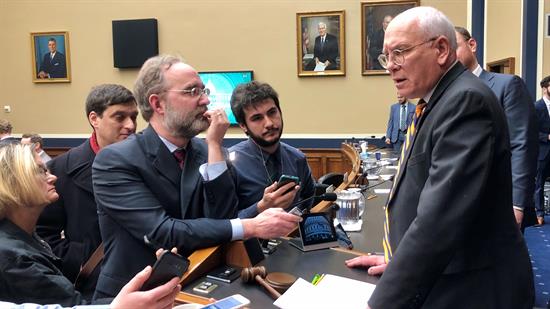- Home
- About
-
Constituent Services
- Academy Nominations
- Community Project Funding
- Congressional Art Competition
- Congressional App Challenge
- Congressional Commendation
- Event Invitation
- Grants
- Help with a Federal Agency
- Internships
- IRA Clean Energy Consumer Benefits
- Know Your Rights: Immigration
- Request a Meeting
- Request Surplus Books
- Presidential Greeting
- Visit Washington D.C.
- Issues & Legislation
- News
- 20th District
- Contact

Press Releases
Tonko Demands Action to Increase Access to Addiction TreatmentCalls out DEA’s failure to respond to bipartisan letter seeking guidance to increase access to addiction medication
Washington,
June 21, 2023
Tags:
Addiction & Recovery
WASHINGTON, DC — Congressman Paul D. Tonko delivered passionate remarks during an Energy and Commerce Health Subcommittee hearing today to push for the passage of his bipartisan Reentry Act, a bill he introduced earlier this year that empowers states to restore access to healthcare, including addiction and mental health treatment, through Medicaid for incarcerated individuals up to 30 days before their release. Tonko also grilled the Drug Enforcement Administration (DEA) about his Mainstreaming Addiction Treatment (MAT) Act, which increased the number of medical professionals who can prescribe the live-saving addiction medication buprenorphine. He called out the DEA on failing to respond to a bipartisan letter he authored asking the agency to provide additional, clear guidance that ensures patients have the access they need and deserve as delivered through his MAT Act. In addition to covering the Reentry Act, today’s hearing also featured discussion of three other bipartisan bills Rep. Tonko introduced as part of his efforts to tackle the addiction and overdose crisis. These included:
View Rep. Tonko’s full remarks HERE and read remarks as prepared for delivery below: Thank you, Chair Guthrie for your work with me on this topic and thank you to my friend Rep. Armstrong for working with me on several of the bills before us today. And thank you to our witnesses for joining us. Our country has a mental health crisis, a substance use crisis, and a fentanyl crisis. Thanks to the bipartisan work this committee did together five years ago in the SUPPORT Act, states can now apply for a demonstration program to use Medicaid for eligible services for justice-involved individuals returning to their communities 90 days prerelease. Currently, federal statute prohibits any form of federal health coverage for incarcerated individuals except under very limited circumstances. In many states, Medicaid coverage is immediately terminated when someone is sent to a correctional setting and in the rest, coverage is suspended, and it takes various lengths of time to restart it. This creates a serious coverage gap when individuals are released, as they often have no access to health care or addiction treatment during a stressful and dangerous time. Mr. Blum, I applaud CMS for moving forward with the demonstration program and through my Reentry Act I hope to codify reentry policy. I also am proud to champion the Due Process Continuity of Care Act with my friends Rep. Trone, Rep. Turner and Rep. Rutherford who also lead Reentry with me. Due Process would make certain that pretrial detainees are not kicked off Medicaid prior to ever being found guilty of a crime.
The recent passage of my Mainstreaming Addiction Treatment (MAT) Act has dramatically expanded the U.S. health care system’s ability to treat opioid use disorder with buprenorphine, increasing the number of medical professionals who can prescribe buprenorphine for opioid use disorder from 130,000 to 1.8 million with the removal of the X-Waiver. I sent the DEA Administrator a bipartisan letter with 20 plus members in March of this year asking several questions about increased access to buprenorphine and specifically asked for the DEA to issue additional guidance to all registrants to ensure patients get access to this life-saving medication. To date, I have not received any response. I also requested a meeting to follow up on this and so far nothing has been set up. I am hearing repeatedly from emergency physicians that when they write prescriptions for buprenorphine, patients are getting told at pharmacies that it’s not available. In many cases the pharmacies are saying they are cut off for the month and are too close to their limit. In some cases, patients give up after going to multiple pharmacies. This is unacceptable that someone would get so close to accessing addiction treatment and then at one of the last steps be turned away. I believe DEA must play a role in clearing up the confusion and stigma and fear coming from pharmacists, distributors, and providers. Everyone is scared that they will be in trouble with DEA for providing buprenorphine for addiction and the result is patients are unable to access the gold standard of prescribed medication for addiction.
|
